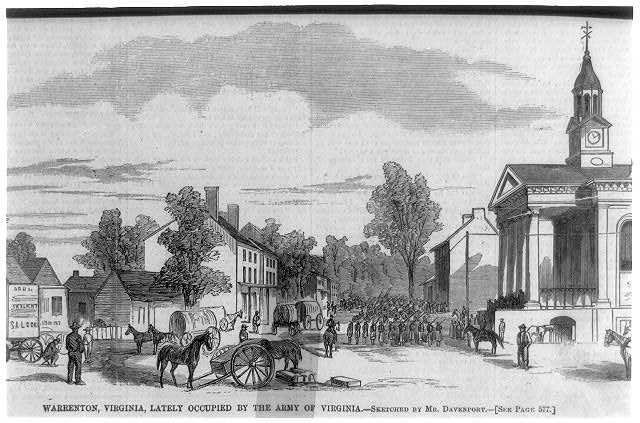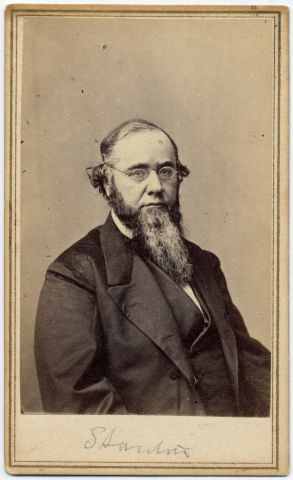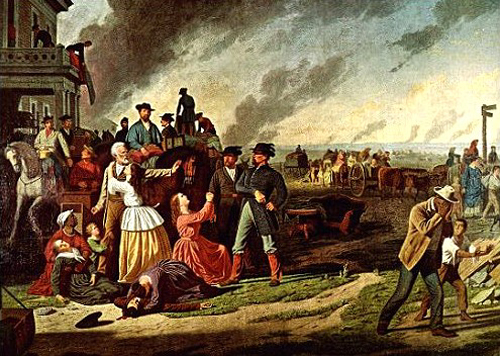From West to East – John Pope and Counter-Insurgency, Part II
(Part II in a series)
In June 1862, John Pope assumed command of the Eastern Theater’s newest army made up of disparate forces – the Army of Virginia. Unfortunately, Pope’s strong ego and dislike for the Army of the Potomac’s popular commander George B. McClellan (at least with the soldiers) placed him at odds with much of his own command. Nonetheless, he hoped to bring a Union victory to the East, specifically in northern Virginia. To accomplish this mission, he needed to control the region.

Similar to his previous command in northeast Missouri, Pope issued a series of orders to his new army regarding their authority over the northern Virginia populace, specifically to curb spying and guerrilla warfare. From the earlier campaigns in the region, in which several spies were caught, Union officers and men were convinced bands of marauders and spies lingered throughout the area.[1] When Pope took command, he hoped to put an end to insurgency in the region near his army.

For instance, in General Order Number Five, the army was given free range to “subsist upon the country in which their operations are carried on.”[2] Another order from Pope was near identical to policies used in Missouri, which once again placed responsibility of guerrilla activity and destruction in the hands of the civilians. In Order Number Eleven, civilians were required to take the oath of allegiance. If they refused, they would be banished beyond the Union lines. If those who pledged allegiance violated that oath, they would be executed. It was a similar punishment for those who re-entered Union lines after being banished. Unlike in Missouri, where he had limited support from his superiors, Pope had near-unanimous backing from the War Department and some of his own army.[3]
In the words of historian Daniel Sutherland, who wrote one of the best-researched books on guerrilla warfare in the Civil War, in 1862, John Pope “redefin[ed] occupation policy in Virginia.”[4] Soon after Pope took command, the Army of Virginia sustained a devastating loss at the Second Battle of Manassas, considered by many to be Lee’s greatest victory. Though the defeated general would be ordered west to Minnesota and would rarely be heard from again during the Civil War, Pope’s legacy went beyond his humiliating defeat and an abrasive personality.

Pope’s war in the Trans-Mississippi West had shaped the limits of enforcement policies to counter guerrilla warfare across all theaters of the war. In conclusion, it is fair to give him credit where credit is due. Pope helped shape the nature of total warfare that would ultimately pave the way for counter-insurgency measures and strategies used by the United State military ever since.
Sources:
[1] John Matsui, The First Republican Army: The Army of Virginia and the Radicalization of the Civil War (Charlottesville: University of Virginia Press, 2016), 118.
[2] General Order No. 5, dated July 18, 1862, Thomas C.H. Smith Papers, Ohio Historical Society; Peter Cozzens, General John Pope: A Life for the Nation (Urbana: University of Illinois Press, 2000), 86.
[3] Secretary of War Edwin Stanton may have been involved in the writing and composition of Pope’s orders.
[4] Sutherland, 105.
Kristen
You hit on “What was the matter with John Pope” when you mentioned his huge ego. Unfortunately Pope’s actual performance in the west was inflated, on paper, by reports of a commander who was not unbiased in writing those reports, giving exorbitant credit where it was not due.
Padding one’s resume can have unintended consequences. In the case of Henry Halleck, the supervisor whose glowing reports on his crony led to Pope’s appointment in the East, he had been installed as General-in-Chief of the Union Armies mere weeks before the disaster at Second Manassas; and he shared blame for that debacle. You reap what you sow.
Well Done on exposing “the problem with Pope.”
Thank you for reading, Mike. However, my goal was not to expose the problem with Pope. I instead wanted to shed light on the larger impact Pope made on counterinsurgency efforts in both Missouri and Virginia. He certainly had a strong, defensive, and pompous personality, no doubt. But, his policies between Missouri and Virginia guided the Lincoln Administration’s evolving views on how to deal with occupation and guerrilla warfare. They ultimately adopted many of his policies and paved the way for the rest of the war.
Ahhh yes, the shameful waging of war against civilians that this country decries about around the world but yet commit’s the same atrocities. They are called war crimes.
Hi Robert, Missouri – being a border state with a population that was subject to occupation – was especially prone to war crimes. War crimes no doubt happened, especially Palmyra and Centralia. Virginia (particularly northern) was in a different but similar situation of occupation by large Federal armies. While I did not tackle the larger questions over whether or not Pope’s policies resulted in war crimes, it is undoubtedly true that many of the civilians that were punished or banished from the occupied territories in Missouri and Virginia were innocent or not tried. They simply held opposing views. There were cases of both blatantly guilty and innocent. But in terms of how this country addresses war crimes, let’s leave that to another discussion.
The record of Pope associates Robert Milroy and Eleazer Paine are instructive. Their actions are recorded in the Provost Marshal Records, U.S. Army. Both these men executed civilians on suspicion and without trial, took civilian hostages ( a violation of General Order #100), and created “free fire” zones. The Provost Marshal records also contain signed orders for the killing of POW’s.
And those responsible were never held accountable and in many cases were promoted with Lincoln’s blessings.